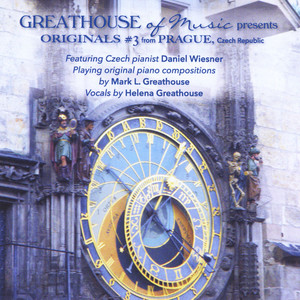
Originals #3 from Prague (Greathouse of Music Presents)
- 流派:New Age 新世纪
- 语种:英语
- 发行时间:2013-05-20
- 类型:录音室专辑
- 歌曲
- 时长
简介
International husband & wife team, Mark from the United States and Helena from the former Czechoslovakia. Each began performing their art at age five in their respective countries. Over the years Mark progressed on the accordion. Meanwhile from age seven throughout her childhood Helena sang on Czechoslovak National Radio and performed in musicals on both Czechoslovak National TV and live theater in Prague. The two met as students at the University of Hamburg in Germany, and during this time they began to perform together. Helena sang and Mark accompanied her on the accordion. Later they were married in Prague, today’s capital of the Czech Republic. Not long after that, Helena joined Mark to live in the U.S., and they both continue to enjoy frequent trips to perform and study in Europe. In recent years Mark has composed many piano pieces, some of which were choreographed and published as dances, while others were written for piano performance. Their two dance books, “Dancing for Fun”, Books 1 and 2, were reviewed in the May/June, 2013 issue of the dance magazine, “American Dancer”. Mark and Helena have performed for many years and continue to do so, presenting a unique blend of Czech, Slovak and other European folk songs as well as modern classics, cabaret numbers and selections from musicals. Helena also performs as a singer, dancer and actor in local theaters in Portland, Oregon. Mark and Helena are the founders of GREATHOUSE of Music. They sell and distribute their own books on music and dance. They also have a line of CDs. Books and CDs are available online. ------------------------------- Featured Pianist Daniel Wiesner Daniel Wiesner was born in Prague in 1969 and studied at the Prague Conservatory with Valentina Kamenkova. He enrolled at Prague Academy of Music as a student of Peter Toperczer. He twice (1988 and 1990) attended master courses of Rudolf Kehrer in Weimar. He received First Prize in the International Piano Competition in Glasgow in 1990 and a prize from Lisbon’s “Vianna da Motta” in 1991. As a soloist and much asked for chamber player, he has given concerts in most European countries as well as in the USA, Jordan and Tunisia. Since 1994 he has been a member of the chamber ensemble “In modo camerale”, which in1996 was awarded the prize of the Czech Association for Chamber Music. That same year he participated in the final round of chamber music competition in Osaka, Japan. Wiesner was entrusted with the first execution of several pieces from his wide repertoire of contemporary composers. He has recorded several solo CDs playing compositions by such composers as Smetana, Prokofiev, and Janacek. He appears as a soloist with several Czech Orchestras including the Czech Philharmonic Orchestra and FOK (film, opera, concert) orchestra. He records regularly for the Czech Radio. Since 2008 in addition to his concert performances, he teaches at the conservatory in Pardubice, Czech Republic. ------------------------------- On Composing, Mark L. Greathouse Composing melodies has always been something mysterious for me. An idea for a melody may come to me when I least expect it. If I’m lucky enough to be at a keyboard or piano, I try and capture it on a small portable cassette player. It may be only a small seed, but from it I can build variations. There is then no telling where it will go. This is how I have operated for years. The process of building on an original idea is basically timeless – sometimes an idea will remain dormant for weeks or months – in the case of “Riverflow” for decades – and then it will come to life. I feel most creative when I am filled with some strong emotion. I may feel sad, lonely, upbeat, loved, appreciated – whatever, but the feeling must be genuine and strong enough to affect me somehow. It is hard to explain the process of creation, because it is somehow just below the surface of awareness. But when the idea comes to me, usually from the heart and based on a feeling, I know it is time to be receptive. And for me the creation is usually based and built upon a simple melody and rhythm. It has always seemed to me that many of the most beloved melodies are in fact quite simple. Think of Beethoven’s “Ode to Joy”, for example, or “Amazing Grace”. I am also aware that if a melody “sticks” in people’s heads, it’s probably a sure sign that it is a good one. Some compositions are not technically difficult to play but contain much in the way of emotion and feeling. Only the masters can truly transmit to the listener the feelings which the composer put into a composition. It is a true joy for me to have found a master artist, Daniel Wiesner, who is able to bring out the feelings I put into these compositions.

